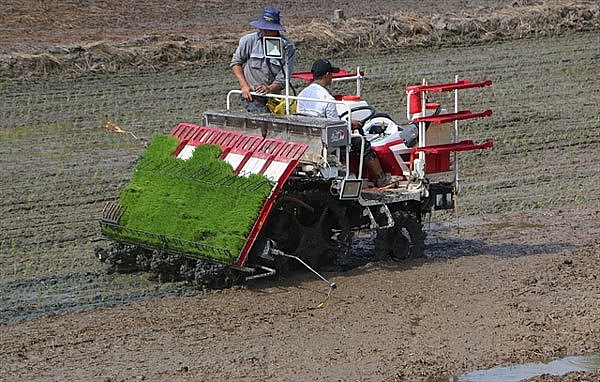Vietnam's Mekong Delta embraces smart rice farming
 |
| Transplanting rice seedlings under a smart rice farming model in Hau Giang Province’s Vi Thang District. – VNA/VNS Photo Duy Khuong |
They use fewer seeds and less pesticides and fertilisers compared to traditional farming methods without losing out on yield or quality.
Smart rice farming also involves the use of advanced technologies like smart rice seeding and transplanting machines and other smart devices.
Hau Giang Province adopted the model on 12ha of rice belonging to 12 farmers in Vi Thuy District’s Vi Thang Commune in April.
The farmers use seeding and transplanting machines integrated with smart fertiliser applicators and pesticide sprayers. These can sow rice seeds or transplant rice seedlings, bury smart fertilisers and spray pesticides at the same time.
The model uses fertiliser deep placement method, which involves placing fertiliser briquettes under the soil.
Pham Minh Quang, one of the 12 farmers, grows 2ha of rice. He said the briquettes release the fertiliser gradually based on the plants' requirements during the growing period so that they do not suffer from an oversupply of urea and thus diseases.
“I had to pray pesticides just once since the beginning of this rice crop to prevent rice blast disease.”
Phan Van Binh, head of the Vi Thuy Plant Protection Division, said the model would help protect the environment since it reduces the use of urea.
The fertiliser deep placement method is used only once during the crop when sowing the seeds, he said.
The use of pesticides also reduces significantly and rice planted under the model can grow more naturally, he said.
Nguyen Van Kinh, chairman of the Vi Thang Commune People’s Committee, said the district is co-operating with relevant units to monitor the model, and it would be expanded in the district if it proves efficient.
Effectiveness
In Dong Thap and Tra Vinh provinces, farmers have used smart rice farming to good effect. Their use of urea has declined by around 40 per cent and the cost of labour for fertilising their fields by 75 per cent.
Fertiliser deep placement has helped reduce greenhouse gases by 40 per cent when used with alternate wetting and drying irrigation.
Smart farming reduces the amount of water required for irrigation by 30 per cent and the labour cost and seed requirement by 50 per cent.
It also reduces saltwater intrusion into rice fields since farmers can actively regulate freshwater through smart devices that monitor the quality of water.
The profit from this model is 20 per cent higher than from traditional methods, according to farmers.
Nguyen Van Khi, a member of the Thang Loi Agricultural Services Co-operative in Dong Thap’s Thap Muoi District and who has used smart rice farming for three years, said irrigation water is regulated by smart devices operated through smart phones.
Dong Thap is seeking to reduce rice production costs and improve quality and expand farming models that use advanced technologies, especially the smart rice farming model in Thap Muoi, according to its Department of Agriculture and Rural Development.
In Tien Giang Province, the Agriculture Extension Centre encourages farmers to expand smart rice farming that uses smart rice seeding and transplanting machines integrated with smart fertiliser applicators and pesticide sprayers.
It recently introduced this model in Cai Be and Go Cong Dong districts and achieved good harvests.
The My Quoi Agricultural Service Co-operative in Cai Be grew 1ha of rice using the model in the spring-summer crop this year.
It sowed 50 kilogrammes of OM 5414 rice seeds and harvested 6.6 tonnes per hectare, 0.8 tonnes higher than under traditional models, which used up to 150kg of seeds.
Tran Thi Cam Nhung, deputy head of the centre’s technology division, said the co-operative’s members earn VND4.7 million (US$200) per hectare more than traditional farmers.
The National Agriculture Extension Centre, the Southern Plant Protection Centre and agriculture extension centres around the delta have been running a smart rice farming programme to adapt to climate change since 2016.
Under it, the delta’s 12 provinces and Can Tho have tried 195 different models so far.
The delta, the country’s rice granary, has nearly 1.7 million hectares of rice fields, with 300,000 – 400,000ha affected by saltwater intrusion through rivers in the dry season.
What the stars mean:
★ Poor ★ ★ Promising ★★★ Good ★★★★ Very good ★★★★★ Exceptional
Related Contents
Latest News
More News
- Congratulations from VFF Central Committee's int’l partners to 14th National Party Congress (January 25, 2026 | 09:46)
- List of newly-elected members of 14th Political Bureau announced (January 23, 2026 | 16:27)
- 14th Party Central Committee unanimously elects To Lam as General Secretary (January 23, 2026 | 16:22)
- List of members of 14th Party Central Committee announced (January 23, 2026 | 09:12)
- Highlights of fourth working day of 14th National Party Congress (January 23, 2026 | 09:06)
- Press provides timely, accurate coverage of 14th National Party Congress (January 22, 2026 | 09:49)
- Press release on second working day of 14th National Party Congress (January 22, 2026 | 09:19)
- Minister sets out key directions to promote intrinsic strength of Vietnamese culture (January 22, 2026 | 09:16)
- 14th National Party Congress: Renewed momentum for OVs to contribute to homeland (January 21, 2026 | 09:49)
- Party Congress building momentum for a new era of national growth (January 20, 2026 | 15:00)

 Tag:
Tag:




















 Mobile Version
Mobile Version